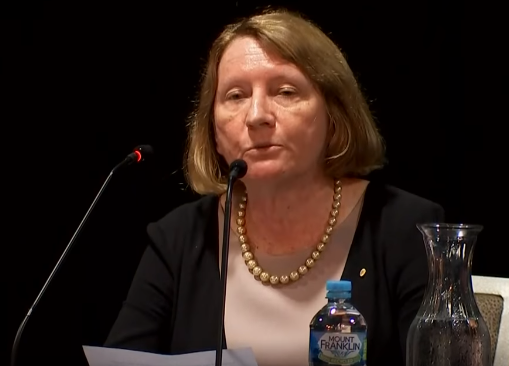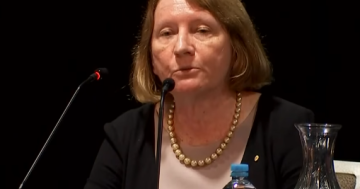
Robodebt Royal Commissioner Catherine Holmes AC SC. Photo: Screenshot.
Royal Commissioner Catherine Holmes has recommended rules be changed to make it harder for ministers and senior public servants to hide behind ”cabinet confidentiality” when implementing policy.
In her final report on the Royal Commission into the Robodebt Scheme, tabled on Friday (7 July), the commissioner has called for substantive changes to avoid a repeat of circumstances that allowed such an illegal program to be rolled out.
She suggested it had become too easy to avoid accountability with the excuse of cabinet confidentiality.
A recommendation of the royal commission is that the Commonwealth Cabinet Handbook be amended so that the description of a document as a ”cabinet document” be no longer itself justification for maintaining the confidentiality of the document.
“The amendment should make clear that confidentiality should only be maintained over any cabinet documents or parts of cabinet documents where it is reasonably justified for an identifiable public interest reason,” the report states.
And she said cabinet itself had been misled at times during the implementation and delivery of the automated debt recovery scheme.
Criticising former prime minister Scott Morrison, from his role as Social Services minister, Commissioner Holmes said he did not properly inquire why his department changed its mind about income averaging requiring legislative change.
The new policy proposal (NPP) instead said nothing of income averaging and the need for legislative change.
This was despite prior advice from the Department of Social Services that legislative change would be needed.
“Mr Morrison allowed cabinet to be misled because he did not make that obvious inquiry …” the commissioner said.
“He failed to meet his ministerial responsibility to ensure that cabinet was properly informed about what the proposal actually entailed and to ensure that it was lawful.”
The royal commission is also scathing of former Department of Human Services secretary Kathryn Campbell, who it says had been responsible for a department that oversaw an unlawful program.
When exposed to information that brought to light the illegality of income averaging, she did nothing of substance, Commissioner Holmes says.
And when presented with opportunities to obtain advice on the lawfulness of that practice, she failed to act.
The royal commission is highly critical of Ms Campbell’s handling of the policy proposal that went to cabinet’s expenditure review committee in 2015.
The report states that Ms Campbell, in her own verbal evidence, accepted that the NPP could mislead cabinet but said her failure to eliminate its misleading effect was an ”oversight”.
“That would be an extraordinary oversight for someone of Ms Campbell’s seniority and experience,” the report states.
“The weight of the evidence instead leads to the conclusion that Ms Campbell knew of the misleading effect of the NPP but chose to stay silent, knowing that Mr Morrison wanted to pursue the proposal and that the government could not achieve the savings which the NPP promised without income averaging.”
The royal commission has made 57 recommendations designed to avoid a repeat of policy failure on the scale of Robodebt.
The recommendations go to, among other things, designing policies with a people-centric focus; improving compliance procedures; clarity over exclusion criteria; and making it easier to engage with Centrelink.
In the preface to the report, Commissioner Holmes says: “It is remarkable how little interest there seems to have been in ensuring the scheme’s legality, how rushed its implementation was, how little thought was given to how it would affect welfare recipients and the lengths to which public servants were prepared to go to oblige ministers on a quest for savings.
“Truly dismaying was the revelation of dishonesty and collusion to prevent the scheme’s lack of legal foundation coming to light.
“Equally disheartening was the ineffectiveness of what one might consider institutional checks and balances – the Commonwealth Ombudsman’s Office, the Office of Legal Services Coordination, the Office of the Australian Information Commissioner and the Administrative Appeals Tribunal – in presenting any hindrance to the scheme’s continuance.”
As previously reported, a separate sealed section of the report names people the royal commission recommends should be pursued with civil and criminal charges.
Prime Minister Anthony Albanese has promised an “appropriate consideration to all of the recommendations” and to what action to take.
“We won’t pre-empt that,” he said. “We will have proper processes.”



















